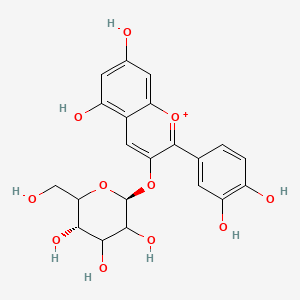| Authors | Title | Published | Journal | PubMed Link |
|---|---|---|---|---|
| Tirupula KC et al. | pH-dependent interaction of rhodopsin with cyanidin-3-glucoside. 2. Functional aspects. | Photochem. Photobiol. | pmid:19267871 | |
| Yanamala N et al. | pH-dependent interaction of rhodopsin with cyanidin-3-glucoside. 1. Structural aspects. | Photochem. Photobiol. | pmid:19192199 | |
| pmid: | ||||
| Katsuzaki H et al. | Cyanidin 3-O-beta-D-glucoside isolated from skin of black Glycine max and other anthocyanins isolated from skin of red grape induce apoptosis in human lymphoid leukemia Molt 4B cells. | Oncol. Rep. | pmid:12579261 | |
| Tsuda T et al. | Dietary cyanidin 3-O-beta-D-glucoside increases ex vivo oxidation resistance of serum in rats. | 1998 | Lipids | pmid:9655373 |
| Miyazawa T et al. | Direct intestinal absorption of red fruit anthocyanins, cyanidin-3-glucoside and cyanidin-3,5-diglucoside, into rats and humans. | 1999 | J. Agric. Food Chem. | pmid:10552420 |
| Kader F et al. | Degradation of cyanidin 3-glucoside by caffeic acid o-quinone. Determination of the stoichiometry and characterization of the degradation products. | 1999 | J. Agric. Food Chem. | pmid:10552861 |
| Tsuda T et al. | Protective effects of dietary cyanidin 3-O-beta-D-glucoside on liver ischemia-reperfusion injury in rats. | 1999 | Arch. Biochem. Biophys. | pmid:10441388 |
| Tsuda T et al. | Absorption and metabolism of cyanidin 3-O-beta-D-glucoside in rats. | 1999 | FEBS Lett. | pmid:10338127 |
| Tsuda T et al. | The role of anthocyanins as an antioxidant under oxidative stress in rats. | 2000 | Biofactors | pmid:11237172 |
Chrysanthemin
Chrysanthemin is a lipid of Polyketides (PK) class. Chrysanthemin is associated with abnormalities such as Dehydration, Endothelial dysfunction, Cardiovascular Diseases, Obesity and Hyperglycemia. The involved functions are known as inhibitors, Process, Pigment, Inflammation and Transcription, Genetic. Chrysanthemin often locates in Membrane, Back, Vacuole, vacuolar membrane and vacuolar lumen. The related lipids are Butanols.
Cross Reference
Introduction
To understand associated biological information of Chrysanthemin, we collected biological information of abnormalities, associated pathways, cellular/molecular locations, biological functions, related genes/proteins, lipids and common seen animal/experimental models with organized paragraphs from literatures.
What diseases are associated with Chrysanthemin?
Chrysanthemin is suspected in Cardiovascular Diseases, Obesity, Dehydration, Endothelial dysfunction, Hyperglycemia and other diseases in descending order of the highest number of associated sentences.
Related references are mostly published in these journals:
| Disease | Cross reference | Weighted score | Related literature |
|---|
No disease MeSH terms mapped to the current reference collection.
PubChem Associated disorders and diseases
What pathways are associated with Chrysanthemin
There are no associated biomedical information in the current reference collection.
PubChem Biomolecular Interactions and Pathways
Link to PubChem Biomolecular Interactions and PathwaysWhat cellular locations are associated with Chrysanthemin?
Visualization in cellular structure
Associated locations are in red color. Not associated locations are in black.
Related references are published most in these journals:
| Location | Cross reference | Weighted score | Related literatures |
|---|
What functions are associated with Chrysanthemin?
Related references are published most in these journals:
| Function | Cross reference | Weighted score | Related literatures |
|---|
What lipids are associated with Chrysanthemin?
Related references are published most in these journals:
| Lipid concept | Cross reference | Weighted score | Related literatures |
|---|
What genes are associated with Chrysanthemin?
There are no associated biomedical information in the current reference collection.
What common seen animal models are associated with Chrysanthemin?
There are no associated biomedical information in the current reference collection.
